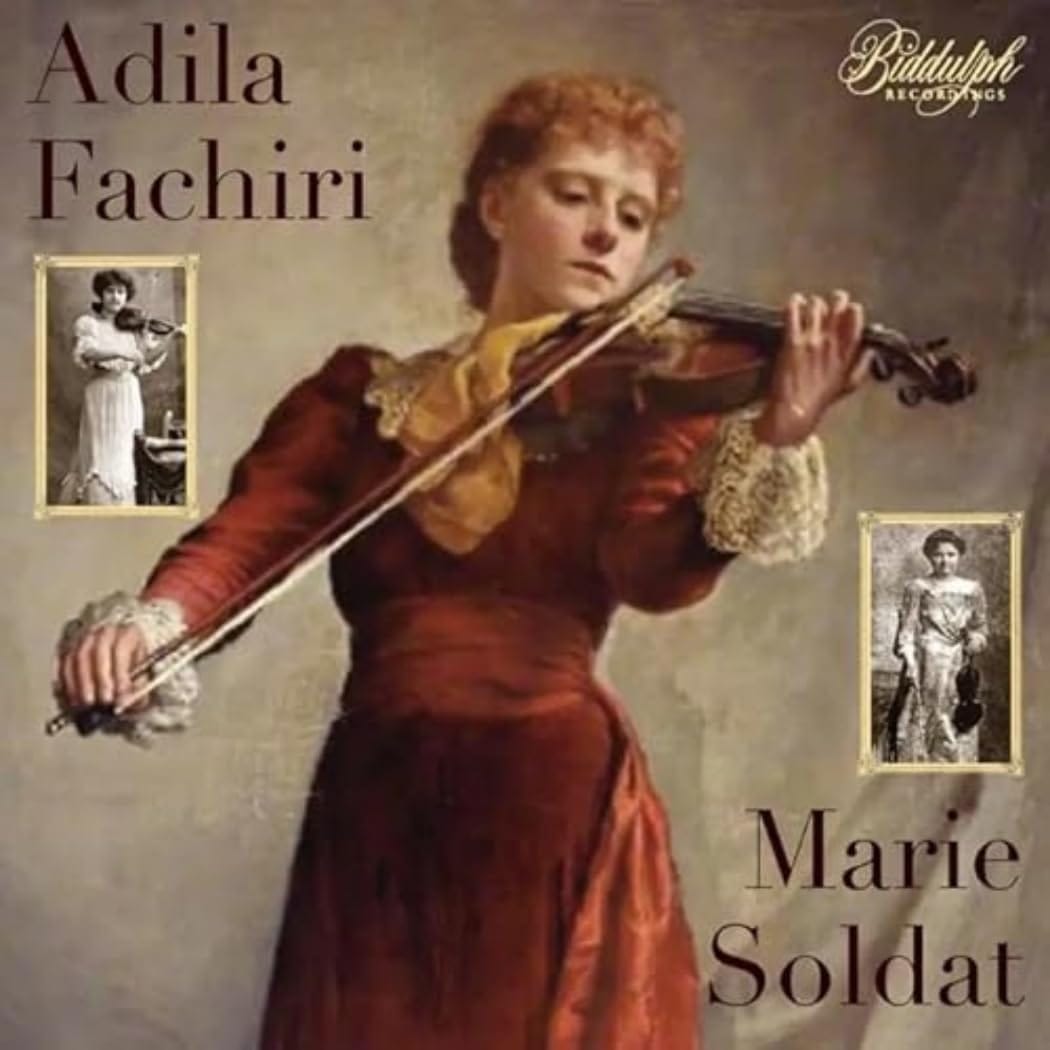Adila Fachiri, Marie Soldat and ... one Donald Francis Tovey
Some fascinating historic documents here. Well worth investigation!

So what's the big deal hee? Two violinists on one disc, one of them - Adila Fachirri - performing with Donald Francis Tovey, he of the Essays in Musical Analysis. Toccata Classics has released recordings of Tovey's own music, and those Essays were part of my teenaged years (before being summarily dismissed in the 1980's hothouse of analysis that was King's College, London - Tovey has made a comeback, by all accounts!).
Adila Fachiri (née d'Aranyi, 1866-1962) was the geeat-niece of Joseph Joachim; her sister was the far better-known Jelly d'Aranyi. The two regularly played the Bach Double Concerto at the Proms, and indeed her is a Vocalion recoding of them with "orchestra" conducted by Stanley Chapple:
Together with the one other d'Aranyi sister, the d'Aranyi's came to London in 1909 as protégés of Tovey: Adila had previously studied with Hubay (and was coached in chamber music by Popper). It was Adila who inherited Joachim's 1714 Strad.
Interesitingly, Adila led a quartet that also included Jelly, the viola player/composer Rebecca Clarke, and Guilhermina Suggia. As a point of interest/gossip, Bartók was in love with both d'Aranyi sisters (although not at the same time). Holst wrote his Double Concerto for them, And while we're here, Rebecca Clarke has ben featured in this post on British song, gemini's for clarinet and strings, while her Ave Maria is on this disc, from Pembroke College.
Here's a performance of Holst's Double Concerto for two violins, with score (Violinist I: Janice Graham, Violinist II: Sarah Ewins, Orchestra: English Sinfonia conducted by Howard Griffiths):
00:00 I - Scherzo 04:40 II - Lament 09:34 III - Variations on a Ground
So, Bach begins the album: the Andante for the Violin Sonata in A, BWV 1015, recorded September 4, 1928 and issued originally on the National Gamophone Society label. It is a lovely reading, the piano (stepping in for harpsichord, of course!) fascinating in its own night. Tovey and Fachiri show real understanding of Bach. This is Biddulph's superb transfer (reissue producer is the experienced Eric Wen; transfer engineer is Raymond Glaspole):
It was Joachim who introduced Fachiri to Tovey. They also play the Beethoven Op. 96 Violin Sonata (the last of its ilk) in a recording spread between June and September 1928. It is a delight; Tully Potter is correct in his characterisically authoritative booklet notes that the ear is constantly dawn to Tovey's playing, his grasp of structure and motivic awareness. But Fachiri is as eloquent as they come; when they move into a dialogue of trills, the results is pure magic, prefacing the held-breath Adagio espressivo:
After a nicely driven Scherzo, Tovey takes the lead with perfect phrasing in the finale, Fachiri's responses suave and attractive. The way Tovey can tease those descents, and yet not over-bend the tempo is remarkable; and he is in complete accord with Fachiri:
There is even a announcement by Tovey himself (included here as track 6) preceding his own completion of "Contrapunctus XIV" from Bach's Die Kunst der Fuge including a thundeous bass (that seems to link to Beethoven' Op. 110, and back for here to the Baach A flavour Fugue from Book I):
Complementing that is a solo violin track, Fachiri in commanding form (and including occasional portamnto) in the Sarabande from the B-Minor Solo Violin Partita, BWV 1002. Fachiri's awareness of Bach's linear workings is fabulous:
The Fachiri part of the programme is rounded off by the famous "Gavotte en rondeau" from the Solo Violin Partita No. 3 in E, BWV 1006.
Marie Soldat (1863-1955) is joined here by pianist Otto Schullhof forr all tracks. Another student of Joachim. Brahms heard Soldat play at Pottschach (where the great composer was taking the waters at the time). She gave only the second performance of the Brahms Violin Concerto in Berlin (with Joachim conducting), and in 1885 she gave the Vienna premiere of the piece (Hans Richter conducing the VPO). The reproduced record labels on the back of the booklet reference her as "Marle Roeger-Soldat"; she married Wilhelm Roeger in 1889. Soldat's main instrument was a 1742 Guarneri del Gesù.
The discs here are all from 1921 and issued on the Union label.
The famous "Air on a G string" is heard in a slow, reflective performnce (including a fair amount of portamento)
Soldat's Mozart is also very much of its time: Schullhof is fabulous here in a piano reduction of the Allegro apart from the Fifth Violin Concerto, and Soldat's articulaation is perfect. She teases often at phrase beginnings, particularly descending ones:
After a remarkably interior version of Beethoven's Romance No. 2 in F, we ge to something really special. As Tully Potter points out in his notes, the Louis Spohr is particularly valuable because Soldat also studied with a pupil of the composer. his is the Adagio from the Violin Concerto No. 9 in D-Minor. yes, there is a lot of portamento again, but it remains a beautiful outpouring, and Soldat's tone is most appealing:
Th remaining tracks are short: Wilhlemj's arrangement of Schuman's "Abendlied" (perhaps a touch distended for modern-day tastes), a remarkably agile Prelude from the Solo Violin Partita No. 1 in E-Major - absolutely terrific playing, full awarenesses of Bach's voice-leading, stably the highlight of the disc - and the Largo from the Violin Sonata No. 3 in C. Both don't begin from the beginning, though: the Prelude quoted below begins from bar 55, while the Largo begins from bar 8:
Some fascinating historic documents here. Well worth investigation!
Available at Amazon here. Follow this link for Spotify.
